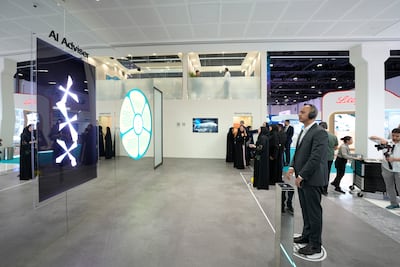Data and artificial intelligence will help drive how healthcare is delivered in the future - and Abu Dhabi Global Healthcare Week has been at the centre of the conversation.
After a three-day conference and exhibition which hosted elite thinkers, innovators, ministers and prime sector players, the key now is to continue the dialogue, says Ibrahim Al Jallaf, division director of digital heath at Department of Health Abu Dhabi.
He described ADGHW as a “beautiful event for global leaders” to meet and “really anchor around two big themes”. Those are future of healthcare and healthcare to health.
With the former, one of the big plays is AI and digitisation. “We brought together leaders in technology and healthtech to say what have been the global success cases, what is really translatable to Abu Dhabi, and what is translatable from Abu Dhabi to the rest of the world,” says Ibrahim.
“When we talk about healthcare to health, it’s a very strong population health improvement focus…how we keep people healthy.
“Of course, best care is of utmost importance, but keeping somebody healthy, living longer, is one of our biggest priorities as the Department of Health.”
A global hub for healthcare and life-science excellence and innovation, Abu Dhabi is actioning ways to solve both aspects, including managing population health “intelligently”.
Malaffi, its regional-first health information exchange, connects physician portals to provide 360-degree understanding of patients.
“Now, we’ve complemented this with AI, we have something called the Patient Risk Profile which all physicians across Abu Dhabi have access to,” says Ibrahim.
“It tells you across multiple disease groups the probability of this person eventually developing that disease, based on all the information we have about the individual.”
Another live example of AI in action is AI Chat With Your Data which draws on the emirate’s various registries, including for cancer or diabetes.
“That allows us to understand and make sure we use data to the fullest extent to be able to regulate and support our strategic partners. And we’re benefitting significantly; it allows us to have a normal layman conversation with our data, to be able to extract insights in real time.”
AI potential in healthcare

Under development, also with the major ADGHW pillar of preventative healthcare in mind, the Population Health Intelligence Platform will enable understanding of the genomic risks of a significant section of the population, so people can be equipped with actionable insights.
Ibrahim says: “Whether it’s about additional screenings or adjustments of habits…we nudge them in the right direction to better take care of themselves to live longer, healthier lives.”
Another AI positive influence, in emergency management, can ensure ambulances and medics are in the right place and treat patients en route to the closest facility with the best, readily prepared experts.
“All of these have huge implications for a healthy population, and, of course, access and quality of care,” says Ibrahim, who emphasises the importance the DOH places on data privacy and security.
In short, AI offers potential to enhance and secure the best from a healthcare ecosystem by boosting efficiency and effectiveness.
“It’s really about action and insights more than it is about the data…data being actively used is critical.
“We’re not here to reinvent the wheel, we do a lot of innovation, but at the same time we also learn from global partners, and we partner connect, and make sure we take learnings from the world to be able to then benefit our citizens.”
Certainly, many ADGHW attendees will be departing inspired by what is happening - and possible - in Abu Dhabi, which Ibrahim says has witnessed “impressive leaps” in terms of AI and digitisation.
“When we have global conversations, we constantly get the message that we are really shaping where the world is going on these topics.
“We have a lot of enablers in place, we’re used to continuously innovating and staying on the edge of how you can really stay ahead and make sure you take care of your citizens to the best of your ability.
“And when we talk to a lot of healthcare leaders across the ecosystem, we see positive responses in terms of collaboration, and we emphasise willingness to collaborate, to share. We see it as a two-way beneficial conversation.”
An inclusive and technology-driven ADGHW has also delivered that, providing a platform from which Abu Dhabi has illuminated the route to achievable healthcare possibilities by accelerating collaboration, innovation, and investment, across the global healthcare and life-science ecosystem.
“We’ve had a lot of very valuable conversations here, with different countries, global healthtech leaders.
“Now we make sure we continue the conversation and implement a lot of the ideas and discussions, to actually result in tangible impact.”
With AI a “supporting tool” in the mix, game-changing prospects are becoming manifest, be they AI-enabled physicians, an AI-enabled workforce across healthcare facilities able to even better fulfil their duties, or AI driving personalised behavioural interventions that result in longer, healthier lives.
“They’re the same problems we’ve been tackling historically, but how we leverage new technologies to add creative ways to solve these problems is the real luxury we have now,” Ibrahim concludes.
“AI is one more tool in the toolkit that allows us to do more than we’ve ever been able to do before.”
